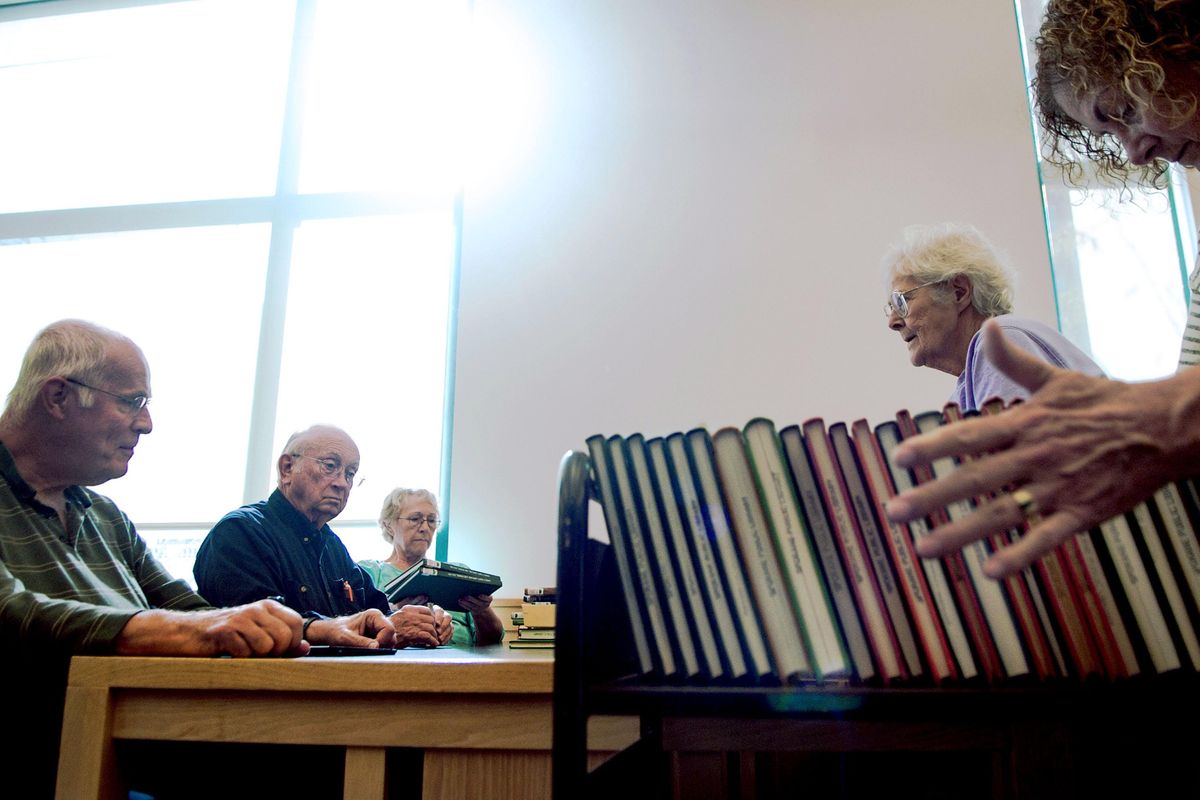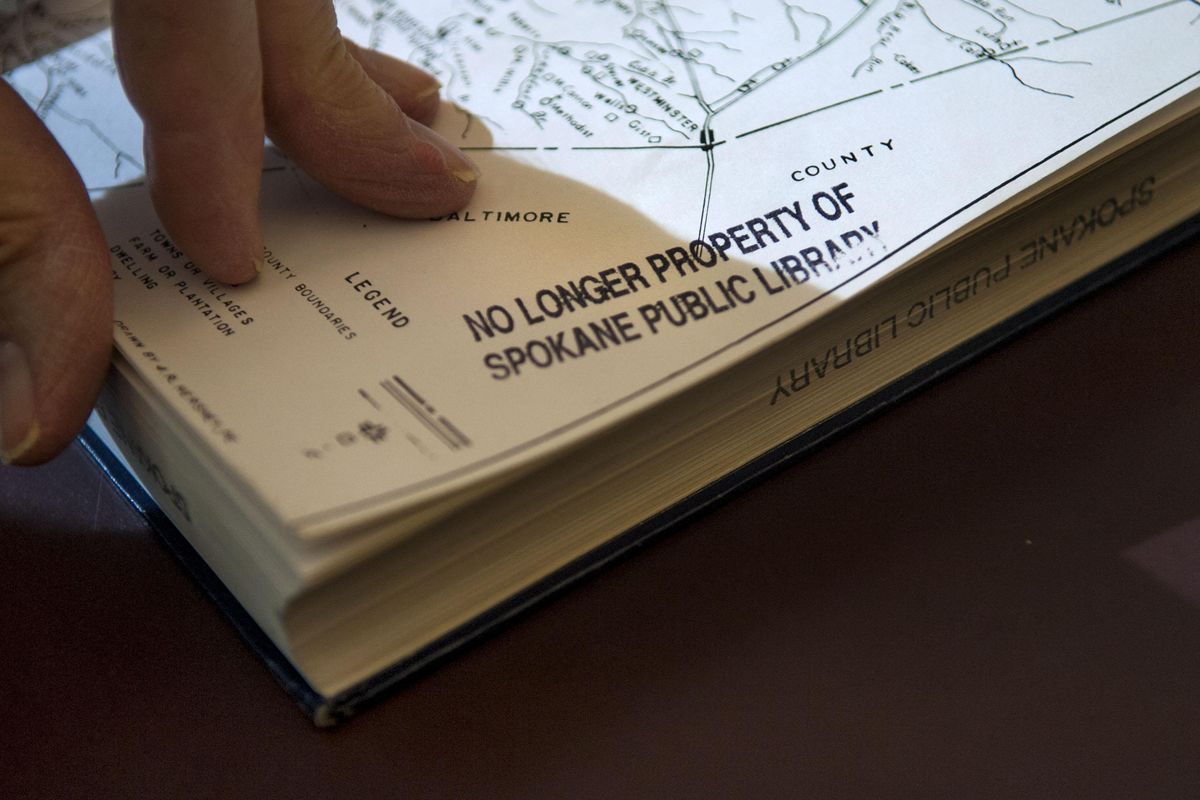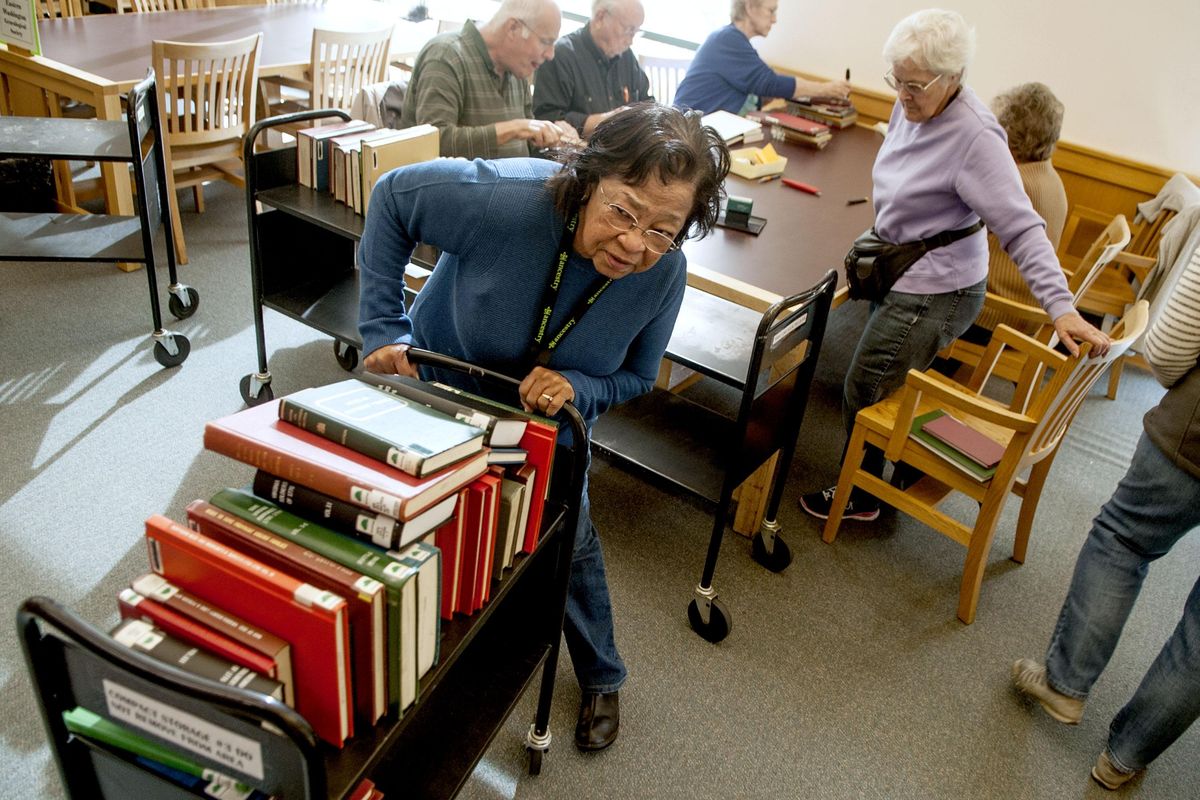Thousands of genealogy books being phased out at downtown Spokane library ahead of renovations

Cilla Carpenter clutched a hardbound volume close to her chest Tuesday morning at the downtown Spokane library.
Within its pages were the names of the Agees, kin of Carpenter’s on her mother’s side dating back to her great-grandmother.
“When I found this book, it was a big deal,” said Carpenter, one of about a half-dozen volunteers with the Eastern Washington Genealogical Society working to purge hundreds of books from the library’s system. “I heard of this book and I said, ‘What if the Agees are in it?’ And they were.”
That book – “Turff & Twig: The French Lands,” an accounting of settlements in the Richmond, Virginia, area in the 1700s – is one of thousands of volumes from the genealogical society’s collection slated to be phased out of the library’s inventory. They’re shelved on the first floor of the downtown library near where volunteers meet with visitors to map out family trees.
“Turff & Twig” will find a place in Carpenter’s personal library, but nearly all the other books will be shipped to libraries in Western Washington and Salt Lake City before the end of the year.
The purge of genealogical books is being done in anticipation of a remodel of the library system’s anchor branch on Main Avenue that will shutter the 25-year-old building for two years, beginning in March.
The society, which has been meeting at the downtown library since it opened in 1994, didn’t receive word they’d have to get rid of books until early summer, said Dolly Webb, president of the society’s board of directors.
The notification came well after voters overwhelmingly approved a $77 million bond measure in November to renovate the library system, including the complete overhaul of the Shadle and downtown branches at an anticipated cost of about $43 million.
John Wilson of The Eastern Washington Genealogical Society turns the page after stamping one of the books that will no longer be part of the Spokane Public Library collection at the downtown library on Tuesday, Oct. 15, 2019. (Kathy Plonka / The Spokesman-Review)Buy a print of this photo
“To my recollection, nothing was mentioned about reducing the size of our collection,” Webb said. “That didn’t come up. So it was, I think, a shock.”
The ballot resolution approved by voters does not include specifics about the downtown library, only that it will undergo a “modernization” along with the South Hill and Indian Trail branches.
The library already has scheduled closure of its Shadle branch for renovations beginning Dec. 22, with a satellite location set to open in NorthTown Mall while crews complete an expansion expected to nearly double the size of the building.
Plans for the downtown library include a space for history research in a building that also houses the collection of the Ned M. Barnes Northwest Room, a trove of primary documents and books focused on the region’s past.
The system will also eliminate some items from the collection in that room, said Amanda Donovan, director of marketing and communications for Spokane libraries.
The goal is to have genealogy and history together in the same climate-controlled space when the remodeled library opens in 2022, with a focus specifically on the Inland Northwest.
“They are part of a new, focused Northwest Room experience,” she said.
The genealogy volumes aren’t checked out like other library materials, Donovan said, which can make it tricky to judge their popularity. But the branch’s closed-shelf genealogy collection, which is only accessible on request, was only accessed six times over the past two years, according to internal library data.
A 2016 plan uses public data to drive decisions for the future, and the public showed a preference for amenities other than genealogy research space, Donovan said.
“An enhanced children’s area was the most requested thing,” she said. “It wasn’t an enhanced genealogy area.”
In anticipation of the closure, Eastern Washington Genealogical Society members are removing books from the shelves, crossing out bar codes and packing most of them up for transport to Salt Lake City, where they’ll join the collection at the Family History Library. That facility, founded in 1894, touts itself as the largest depository of genealogical reference materials in the world and is affiliated with the Church of Jesus Christ of Latter-day Saints.
Another 700 books were accepted by the Langley Archive & Research Center, a historic library open by appointment on Whidbey Island.
The society reached out to the Northwest Museum of Arts and Culture and local universities to see if they wanted to house the collection, Webb said. None expressed interest.
The society, which has in the past helped trace the lineage of African slaves sold by Georgetown University and aided reporters trying to piece together mysteries about historical artifacts, was originally concerned the books would have to be sold or disposed of, said Juanita McBride, the group’s volunteer librarian. Some even joked the books would be thrown in the massive holes dug outside the library where the city is installing an underground stormwater tank.
“I have been involved in the purchase of a lot of the materials here,” McBride said. “But I’m also reasonable enough to understand that, you know, progress is progress. Whether you like it or not, there’s some things that you have to learn to deal with.”
Webb said when she started conducting genealogical research 15 years ago, it was mostly done with books. Clients now can access most of that same information through online databases in the comfort of their own home, which has caused attendance at workshops and other society events to dwindle.
“We have found that, in our organization, people like to sit in their jammies and research, instead of getting dressed and coming down here,” said Webb.
Volunteers are prioritizing local genealogical books, marking them on the shelves with handwritten signs identifying the volumes as “keepers.” Those books being marked for donation are volumes like the one Carpenter selected, detailing families and settlements on the East Coast and in the Midwest and New England.
The loss of those resources means local folks will likely have to access online resources to trace their own lineage west, rather than having books on hand to help that process, McBride said.
“We have probate, wills, death records, cemetery records, some birth records, histories of counties,” she said. “You get information on migration routes when you get into the history of the counties and the states.”
The genealogy society’s roughly 125 members will continue to meet in the downtown library and assist visitors on Tuesdays until the branch closes for renovation. While it’s closed, they’ll hold their business meetings at a local architectural firm that has agreed to host them, and the group plans to hold free workshops at other system branches.
Purging the books is a difficult process, but members say they’ve come to terms with it as a sign of the times and with the knowledge the books would be available to others trying to piece together their family trees.
“We’re book people,” Webb said. “Libraries are books, to us.”



